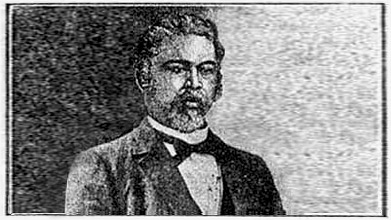The question is simply this: Can a negro, whose ancestors were imported into this country, and sold as slaves, become a member of the political community formed and brought into existence by the Constitution of the United States, and as such become entitled to all the rights, and privileges, and immunities, guarantied [sic] by that instrument to the citizen? …We think they are not, and that they are not included, and were not intended to be included, under the word "citizens" in the Constitution, and can therefore claim none of the rights and privileges which that instrument provides for and secures to citizens of the United States. On the contrary, they were at that time considered as a subordinate and inferior class of beings, who had been subjugated by the dominant race, and, whether emancipated or not, yet remained subject to their authority, and had no rights or privileges but such as those who held the power and the Government might choose to grant them.
Dred Scott vs Sanford 60 U.S. 393 (1857)
This decision by the United States Supreme Court describes the context in which African descendant George Liele became the first missionary from the United States. Liele and his family left the United States for Jamaica in 1783; thirty years before the first White missionary (Adorinam Judson) left North America; ten years before the so-called Father of Protestant Missions (William Carey) left England for his first missionary endeavor.
As a young man, Liele heard a clear message of salvation preached through a Baptist minister. Liele’s owner, Henry Sharpe, was a God-fearing deacon in the Baptist church and would take Liele to services in the Georgia-based Buckhead Creek Baptist Church. Although Liele had a “natural fear of God from [his] youth” (Sidewell, 9) he didn’t understand salvation. Instead, Liele lived by a moral code based on a fear of death and sin. At approximately the age of 23, after months of hearing the gospel preached, Liele would recall,
I saw my condemnation in my own heart, and I found no way wherein I could escape the damnation of hell, only through the merits of my dying Lord and Savior Jesus Christ which caused me to make intercession with Christ for the salvation of my poor immortal soul.
Immediately, Liele asked for his own role in God’s work. “I requested of my Lord and Master to give me a work. I did not care how mean it was only to try and see how good I would do it.” Compelled by the love of Christ, Liele was burdened for the salvation of fellow slaves and began by explaining the scriptures to them.
Immediately, Liele asked for his own role in God’s work. “I requested of my Lord and Master to give me a work. I did not care how mean it was only to try and see how good I would do it.” Compelled by the love of Christ, Liele was burdened for the salvation of fellow slaves and began by explaining the scriptures to them.
In the 18th & 19th century, such actions were a life-threatening endeavor; the American slavery system was based on the idea that Blacks were an inferior species. Anything that threatened to shake this foundation was often met with violence. But instead of violence, something incredible happened. The minister of Buckhead Creek Baptist Church recognized Liele’s gift of preaching and prompted Henry Sharpe to free George Liele so that he would be able to preach unhindered. Just before the Revolutionary War—and just a few years after becoming a follower of Christ—George Liele became a free man according to the laws of the land.
As the first known African American ordained Baptist minister, Liele persevered through the indignities of being a Black man in the South during the active slave system. After his former slave owner was killed in the Revolutionary War, Henry Sharpe’s sons challenged Liele’s freedom and had him imprisoned. Through the intervention of a British officer, Liele’s papers of freedom were miraculously recognized and he was released from prison.
Liele went on to plant a plantation-based church in South Carolina, preach effective evangelistic messages in Savannah, Georgia, and plant churches of slave and free Blacks. But in order to continue preaching the gospel, George Liele and his family decided to indenture themselves to Colonel Kirkland in exchange for passage to Kingston, Jamaica. After paying off his debt, Liele preached the gospel among the slaves there. Liele didn’t have access to financial backing for his ministry, so out of necessity and determination to answer God’s call on his life, Liele became a bi-vocational minister. While working as a hauler of goods and as a farmer, Liele pastored a congregation he planted of both free and enslaved Blacks.
Through waves of violent opposition from White plantation owners Liele continued his ministry on the island. Seeing hundreds of souls come to Christ, planting several churches, raising up ministers and even establishing a school for the children of free and enslaved Blacks.
Liele died in 1828 after decades of life and ministry in Jamaica. Though unrecognized as a citizen of the land of his birth, Liele lived as a citizen of the Lord’s country doing well the work the Lord gave him.
Sources
- America’s First Missionary http://www.thetravelingteam.org/articles/george-liele
- “Africans in America” Resource Bank. George Liele http://www.pbs.org/wgbh/aia/part2/2p49.html
- Profiles of African-American Missionaries, Edited by, Robert J. Stevens & Brian Johnson. © 2012 By The Cooperative Missions Network of the African Dispersion (COMINDAD) Published by William Carey Library. Page 9, “George Liele: Missions Pioneer,” by Mark Sidwell.
- http://www.loc.gov/teachers/classroommaterials/connections/slaves-court/file.html
